wellnessrounds
Don't hurt anything that has a name.


Words of Welcome and Advice to New Medical Students: The DeBakey Scholar Convocation Address

It’s so good to be here with you—what an exciting day. I was asked to share some thoughts that might be relevant to you all as you get started on this incredible ride. I’ll get back to the Paul in a moment—just to say here that, from a purely literary sense, there’s something to admire in his lists, their cadence and directionality. Most of the rest of what I’ll have to say is from Greek pagans but they just can’t compete with this poetry, so I put it first.
I remember sitting where you are now on my first day. The woman who is now my wife was halfway across the country; I was in a new city, sweating profusely, with a slowly dawning perception that I didn’t actually know what I was getting myself into. Over time I found a place, some solid friends, some good study habits. We all helped one another through. I’m sure you will do the same.
What I wanted to share with you today, though, is something that I think is pretty important you know up front. Here it is: You are all about to devote a tremendous amount of time and energy over the next four to…fourteen years…on something that is not enough. I’ll say it again: a tremendous amount of time and energy will go to something that isn’t enough. Medicine—the science, the practice—won’t get you through. It can’t sustain you on its own, through all through the hard days, the specter of burnout, nor can it sustain the lives we will cultivate with others while we are here in school. There’s a temptation sometimes to think it will, or at least to slip into the illusion that the whole world is just a somewhat distracting corner of medicine, instead of remembering that medicine is really just a small part of the world. But we can’t forget that—and our patients, if we listen to them, won’t let us.
For us, medicine is (or will soon be) a way of life. We’ll eat and sleep in the hospitals—and sometimes, we won’t eat or sleep, but we’ll still be in the hospitals. But for the patients we serve, their days are anything but normal. They—often regardless of how sick they are—are in extremis . This day that you just walked into represents to them disorientation, rupture, interruption of their story and sense of self, reckoning with an unseen, threatening force. We would do well not to forget that.
Narrative theorist Arthur Frank writes of what he terms ‘spaceship ethics,’ named after a physician’s anecdote of leaving his home and imagining his car a spaceship, carrying him to a distant world where “terrible things happen,” all the while refusing to acknowledge that his planet and the planet of the hospital are one in the same. The problem here is that the physician is isolated—from his patients, his role, and even from himself. What Frank proposes instead is to invest deeply in stories–essentially, being willing to be open to the ways that stories are the first inroads to a more personal and specific way of being-toward-the-other. Others have picked up his argument to strongly argue that we as clinicians need also to look outside of medicine, and toward things like living traditions, authentic relationships, good art, the natural world–not just to relate to our patients better or to help ourselves recharge but also to help us do the work that, ideally, we’re trying to do. Medicine—the science—pushes us to efficiency, effectiveness, near-perfection. There is a lot of power in that. But healing—I hesitate to call it an art because it is more than that, more than artifice and closer perhaps to a way of being—healing sometimes requires inefficiency. Hesitation. Our wounded nature encountering another wounded nature, and stopping long enough to witness their suffering and, even if we cannot take it away , being willing to be changed by it. How?
I promised you pagans. Aristotle said, “the virtue of a man…will be the state of character which makes a man good and which makes him do his own work well.” There is a sense, in his writing, that virtues—from virtus, excellence, worth, developed through habit—are the raw materials for a well-favored life in which work is integrated into a greater and more important pursuit of being a good human being. Philosopher Craig Irvine at Columbia wrote, “I must care for my hands, if I am to lift the fallen; my heart, if I am to love the stranger; my mind, if I am to cure the ill; my eyes, if I am to find the lost, and my soul, if I am to guide them home.” I would challenge you to find a few ways to sustain yourselves that are not simply disconnected from medicine, and to avoid the slow gravity toward “spaceship ethics”—but instead to look to each other to begin to cultivate those strengths—humility, courage, charity, patience—that can sustain us as we remain human in the face of the suffering we will inevitably see.
Baylor has given me a tremendous education. Now in my fourth year I can almost feel the first little shoots of competence poking up over the vast freshly-fertilized fields of my inexperience. Thomas Merton said, “The world is made up of people who are fully alive in it: that is, of the people who can be themselves in it and can enter into a living and fruitful relationship with each other in it.” Education, then, should be one of the ways that we learn who we are, what we have to offer, and how to make that offering valid to the contemporary world. Baylor has provided that type of space for me while laying a solid foundation, and I have confidence that the faculty here will do the same for you.
As I look ahead, there’s one particular virtue that I would personally like to cultivate, that seems especially fitting especially after this last month at Texas Children’s Hospital with patients and families who are uprooted from home. Here’s a long quote from Henri Nouwen from his book called “The Wounded Healer,” and then I’ll wrap up.
“Hospitality is the virtue that allows us to break through the narrowness of our own fears and to open our houses to the stranger, with the intuition that salvation comes to us in the form of a tired traveler…Paradoxically, by withdrawing into ourselves, not out of self-pity but out of humility, we create the space for others to be themselves and to come to us on their own terms…But human withdrawal is a very painful and lonely process, because it forces us to directly face our own condition in all its misery as well as all its beauty…[W]hen we have finally found the anchor place for our lives within our own center we can be free to let others enter into the space created for them, and allow them to dance their own dance, sing their own song, and speak their own language without fear. Then our presence is no longer threatening and demanding, but inviting and liberating.”
Enjoy this time—it is fun. Study hard, and try to do it for someone else. Be good to one another, to your patients, to yourselves. I wish you all the best.
The address given by the Mark Kissler, MS4, the 2014 Debakey Scholar of Baylor College of Medicine on July 30, 2014 at convocation for the class of 2018.
Share this:
1 thought on “ words of welcome and advice to new medical students: the debakey scholar convocation address ”.
This speech was so touching to this aspiring doctor. Thank you for your hard work – I know that kind of depth and wisdom does not come easily. You are a very real inspiration.
Leave a Reply Cancel reply
Discover more from wellnessrounds.
Subscribe now to keep reading and get access to the full archive.
Type your email…
Continue reading
Speeches HQ
6 Doctor Introduction Speech Samples
Medical professionals make their mark through exceptional patient care. Still, a well-crafted introduction speech can set the right tone and build trust from day one. These sample speeches show different approaches to connecting with various audiences while maintaining professionalism and authenticity.
Whether speaking at a hospital orientation, medical conference, or community health event, medical professionals need clear, engaging ways to present themselves. The following speech samples offer practical templates you can adapt to your specific needs.
Doctor Introduction Speech Samples
Here are six carefully crafted speech samples that medical professionals can use as inspiration for their own introductions.
1. Welcome Address at Hospital Staff Meeting
“Good morning, everyone. Dr. Sarah Chen here, your new Chief of Cardiology. Before we start discussing patient care protocols, let me share a quick story. Twenty years ago, as a medical student, I watched a skilled cardiologist save my father’s life. That day shaped my path in medicine. Through years at Mayo Clinic and Cleveland Heart Center, I’ve dedicated myself to bringing innovative cardiac care to patients while mentoring fellow physicians.
My approach combines cutting-edge treatments with genuine patient connection. Each person who walks through our doors deserves both medical excellence and compassionate care. Together, we’ll build on this department’s strong foundation and push boundaries in cardiac medicine. My door stays open for your ideas, concerns, and collaboration. Let’s work as one team to give our patients the outstanding care they deserve.”
— END OF SPEECH —
Commentary: A powerful blend of personal story and professional credentials that establishes authority while showing vulnerability. Best suited for first-time meetings with medical staff or department introductions.
2. Presentation at Medical Conference
“Hi everyone, Dr. James Williams speaking. As a pediatric neurologist studying autism spectrum disorders, I’ve spent the past 15 years working with remarkable children who see the world differently. My research at Boston Children’s Hospital focuses on early intervention strategies and family support systems.
The latest findings from our longitudinal study of 500 families challenge traditional assumptions about cognitive development patterns. We’ve discovered promising new approaches that could reshape early intervention protocols. During this session, we’ll examine these findings and discuss practical applications for your practice.
But first, here’s what drives my work. Every child deserves the chance to reach their full potential. Every parent deserves clear answers and real support. By sharing knowledge and working together, we can better serve these families who count on us.”
Commentary: Combines research credentials with genuine passion for patient care. Perfect for academic conferences, grand rounds, or professional development sessions.
3. Community Health Center Introduction
“Hello neighbors, Dr. Maria Rodriguez here. As the newest family physician at Riverside Community Health Center, I bring both medical expertise and deep personal connection to this neighborhood. Growing up in a similar community taught me how access to quality healthcare transforms lives.
After completing my residency at Stanford, I chose community medicine because nothing beats helping families stay healthy. My focus areas include preventive care, women’s health, and managing chronic conditions like diabetes and hypertension. Speaking both English and Spanish lets me connect with more community members and ensure everyone receives the care they need.
Your health goals become my goals. Together, we’ll create treatment plans that fit your life and help you thrive. Thank you for welcoming me to this amazing community.”
Commentary: Emphasizes community connection and practical medical expertise. Ideal for community health center introductions or neighborhood medical outreach events.
4. Medical School Guest Lecture
“Thank you, Professor Chen, for that introduction. Students, I’m Dr. David Park, and I practice emergency medicine at Metropolitan General Hospital. My path here started exactly where you sit now, wondering if I could handle the challenges ahead.
Emergency medicine demands quick thinking, steady hands, and a calm mind under pressure. But technical skills only take you halfway. The other half comes from connecting with patients during their most vulnerable moments. My time treating earthquake victims in Haiti and running a busy ER in Chicago taught me that medicine transcends borders and backgrounds.
Today, we’ll explore how emergency medicine combines scientific precision with human compassion. Get ready for real cases that will challenge your medical knowledge and push you to think on your feet.”
Commentary: Balances professional accomplishments with relatable student experience. Well-suited for guest lectures, student mentorship programs, or medical school events.
5. Private Practice Opening
“Good evening, everyone. Thank you for joining tonight’s open house. I’m Dr. Rachel Foster, and this new family practice represents a dream coming true. After ten years at City General Hospital, I wanted to create a medical home where patients receive personalized attention and comprehensive care.
Modern medicine often feels rushed and impersonal. Our practice takes a different approach. We schedule longer appointments, offer same-day sick visits, and build lasting relationships with families. My background in internal medicine and geriatrics helps me care for patients across all life stages.
Let me show you around our office and explain how we make quality healthcare accessible and comfortable for everyone.”
Commentary: Presents a clear vision while emphasizing patient-centered care. Excellent for practice openings, patient orientation sessions, or healthcare marketing events.
6. Medical Resident Orientation
“Good morning, new colleagues. Dr. Michael Chang speaking, Director of Residency Programs. Looking at you reminds me of my first day as a resident. The excitement mixed with nervous energy feels familiar even now.
Residency shapes not just your medical skills but your entire approach to patient care. During your time here, you’ll face challenges that stretch your abilities and moments of triumph that remind you why you chose medicine. Our program emphasizes both clinical excellence and physician wellness.
My role goes beyond teaching medical procedures. I’m here to support your growth into confident, compassionate physicians. Starting today, you join a supportive community dedicated to learning and healing.”
Commentary: Strikes an encouraging tone while setting clear expectations. Perfect for residency orientations, teaching hospital welcomes, or medical training programs.
Wrapping Up: Doctor Introductions
Creating an effective introduction speech takes careful thought and genuine expression. By studying these examples and adapting their elements to your style, you can craft introductions that resonate with your audience while staying true to your professional identity. The best speeches combine competence with authenticity, letting audiences connect with both the physician and the person.
vitummedicinus.com

Thursday, July 31, 2008
- Speeches for Medical Students
A little while ago somebody googled my blog looking for "SPEECHES FOR NEW MEDICAL STUDENTS." (Yes, I do sometimes look at the things you type in order to find my blog. Sometimes I even make fun of the weirder ones .) I'm not sure if the googler was a professor who needs to give a speech to welcome new medical students, or a new medical student who can't wait to hear what you're going to learn about when you start classes. My money is on the first one... in the many times I end up helping older people with basic computer things, I have found that lots of them aren't aware that the CAPS LOCK button does something other than ensure your cap doesn't get blown off in the wind. Digressions aside, for whatever your intention, here is a summary of some of the speeches we have received in medical so far. Hopefully here you find what you are looking for. SPEECH # 1: "CONGRATULATIONS!" SPEECH OCCASION: First day of medical school (Morning) SPEECH GIVEN BY: Faculty member up to but not including the Dean. SYNOPSIS: Congratulations! You are the best of the best! Here is a slide show of all the people in our department. Come see us anytime! Don't forget - you're the best - and congratulations. And one more thing: from all of us, congratulations. # OF TIMES THE WORD "CONGRATULATIONS" USED: 529 SPEECH #9: "SEEING PATIENTS" SPEECH OCCASION: Second day of medical school (Afternoon) SPEECH GIVEN BY: Faculty members of the Family Practice course SYNOPSIS: Congratulations on making it in to medical school and starting a career of giving professional advice to patients! But don't try giving anybody advice while you're still in medical school. You're allowed to ask patients what their expectations are of the visit, though. Congrats! # OF TIMES THE WORD "CONGRATULATIONS" USED: 116 SPEECH #4, 9, 10, 12, 13, 15, 18, 19, 22, 28: "PROFESSIONALISM" SPEECH OCCASION: Following an expectation of our faculty that is not met by the students, or the sending of an inappropriate e-mail by a single inappropriate student SPEECH LENGTH: Variable, usually 10-30 minutes NUMBER OF STUDENTS PRESENT: Variable, declines throughout the semester SPEECH GIVEN BY: Faculty member, increasing in rank and decreasing in familiarity to the students SYNPOSIS: Don't talk during lecture, don't bend the bendable microphones in the teleconferencing rooms, don't bring coffee into the lecture hall, and don't send inappropriate e-mails to professors. # OF TIMES THE WORD "CONGRATULATIONS" USED: 0 SPEECH #11: "EXAMS ARE COMING UP" SPEECH OCCASION: 1 week before end-of-first-year finals SPEECH GIVEN BY: A faculty member introduced to us in the first week whom none of us remember SYNOPSIS: Just because you pass all your finals, it doesn't mean we will let you pass first year. Also, if you fail a final, most people get to re-write finals they fail, but don't expect this. Remedials are a privilege, not a right. Study hard. # OF TIMES THE WORD "CONGRATULATIONS" USED: -1 SPEECH #29: "WELCOME TO SECOND YEAR" SPEECH OCCASION: First day of second year SPEECH LENGTH: 10 minutes SYNOPSIS: First year was a cakewalk. This year, you have to study your butt off. You have to read outside the lectures. The teachers aren't really here to teach this year, just to give you an idea of what you need to study on your own. This is my office staff, they work for me. Study. # OF TIMES THE WORD "CONGRATULATIONS USED: once, sarcastically
4 comments:
ahahahaha soooo true (just finished my first year of med, think i heard variations of all of those)!
"# OF TIMES THE WORD "CONGRATULATIONS" USED: -1" LOL. This line just cracks me up. I can fully relate.
Hysterical! I'm pretty sure we got those lectures, verbatim. Definitely got the "professionalism" one after an email train about our shitty prof went haywire. Of course, we should have known the dean of students gets Cc'ed on all our class listserv emails...
Speech #29: How do I access the entire speech? Thank you.
Post a Comment
First Time Here?
Vitum posticles popularis.
- New to medical blogs?
- Archived polls: vote, see results
- First time doing CPR
- First breast exam
- Top 10: Things I learned on House
- Top 10: Med Application gimmicks
- Comparison: Jail vs. Med School
- Making a grown man cry
- Series: Top 10 lists
- Series: Pharmaceutical industry
- Series: Interdisciplinarity
- Series: Posts For Pre-Med Students
Posticles Historicus
- ► December (1)
- ► September (1)
- ► August (3)
- ► June (3)
- ► May (2)
- ► April (2)
- ► March (1)
- ► February (3)
- ► January (2)
- ► December (2)
- ► November (4)
- ► October (3)
- ► September (6)
- ► August (6)
- Why should pre-med students read medical blogs? Be...
- Vitum goes high-tech: Which PDA I chose, and why
- Sometimes it seems as though the world's greatest ...
- The failed mandate of our family practise course
- Blinded by the silver lining
- Doctors are better than nurses.
- Oh, you're a medical student?
- My new favourite blog: Science-Based Medicine.
- ► June (4)
- ► May (5)
- ► April (5)
- ► March (4)
- ► February (2)
- ► January (4)
- ► December (6)
- ► November (2)
- ► October (4)
- ► July (13)
- ► June (10)
- ► May (3)
- ► April (8)
- ► March (7)
- ► February (14)
- ► January (9)
- ► December (4)
- ► November (8)
- ► October (12)
- ► September (11)
- ► August (10)
- ► July (3)
- ► June (2)
Vitum Bloggicus
- Addicted to Medblogs
- Adventures in Med School
- Aggravated DocSurg
- Ah Yes, Med School (Fake Doctor)
- Counting Sheep
- Cut on the Dotted Line
- Cut to Cure
- Doctor Anonymous
- EM Physician - Backstage Pass
- Fingers & Tubes in Every Orifice
- Grand Rounds (Compilation)
- Highly Trained Monkey
- Homeschooled Med Student
- Incidental Findings
- Inside Surgery
- Internal Medicine Doctor
- Just Keep Breathing
- Med Student Blogs (Compilation)
- Musings of a Dinosaur
- Of Short White Coats
- On Doctoring
- Over My Med Body!
- Paramed: A Paramedic's Plight
- Respectful Insolence
- ScienceRoll
- Surgeonsblog (Dr. Sid Schwab)
- That Med School Guy
- The Angry Medic
- The Doctor Blogger
- The Evil Resident
- The Exam Room of Dr. Charles
- The Fat Doctor
- The Rumors Were True
Vitum Statisticus
Vitum finus printicus, *finus printicus.
Words of Welcome to Students During Orientation Week
Advice and encouragement to students from across the university
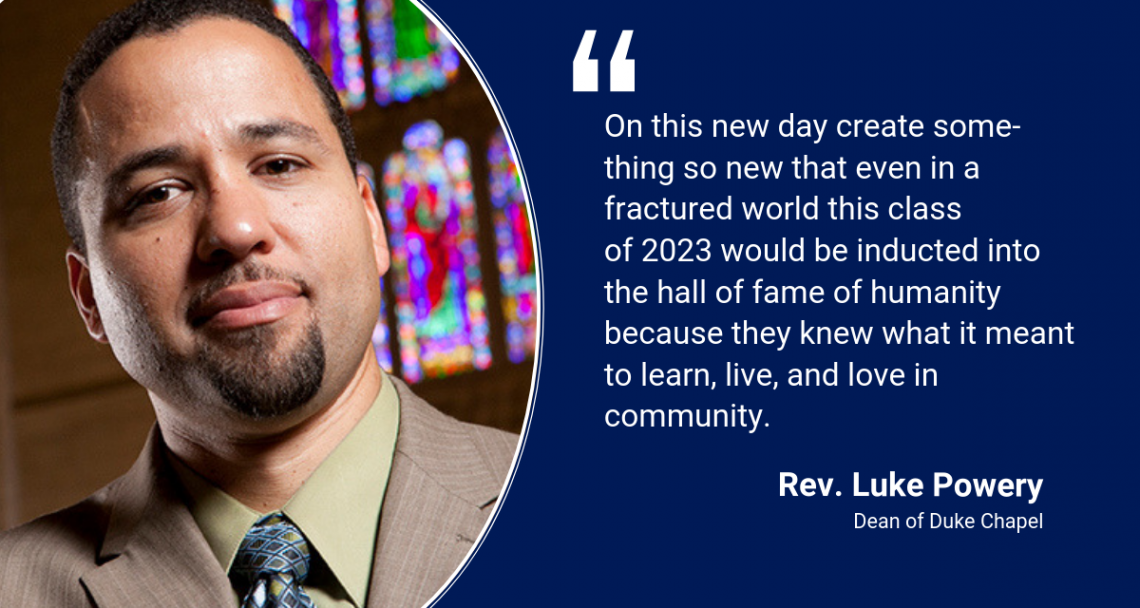
- Share this story on facebook
- Share this story on twitter
- Share this story on reddit
- Share this story on linkedin
- Get this story's permalink
- Print this story
So what’s next?
The Class of 2023, as well as new graduate and professional students, have settled in but many are probably wondering what the next few years holds for them at Duke.
One key element of Orientation Week is, as its name implies, getting students going in the right direction. Part of that is feeling welcomed and at home here on campus. Part is learning how to put your best foot forward, regardless of your backgrounds and previous experiences.
Below is a selection of the many words of welcome delivered this week by faculty, administrators and students alike to various student groups, all designed to help them thrive in their Duke experience.
Class of 2023 Undergraduate Convocation
President Vincent Price
“Here before you at Duke, along that imaginary line that traces the road between East Campus and West, an entire universe of knowledge awaits your exploration. So, brave explorers in the class of 2023, may the next four years take you on a remarkable journey of discovery that begins now. Congratulations, and welcome.”
(For the full speech, click here.)
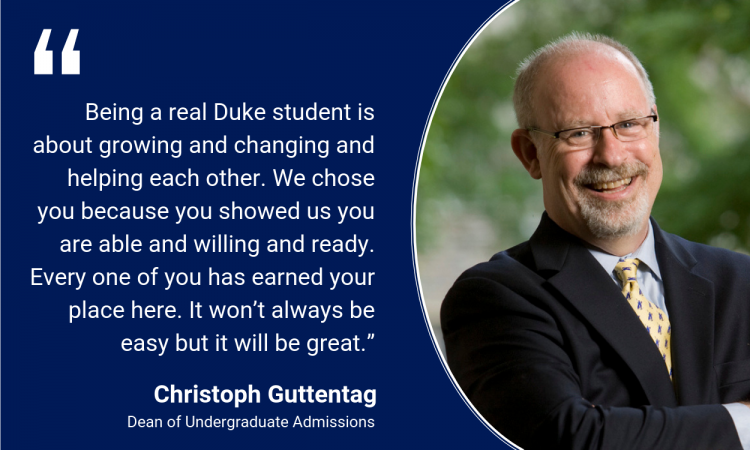
Dean of Admissions Christoph Guttentag
“My staff and I had the pleasure of helping with move-in and it represents some of what we love so much about Duke. The enthusiasm, the warmth, the careful planning and the spontaneous celebrations. And most important, the efforts of so many people coming together simply to help other people who need it. That sense of community is a part of what makes Duke special and now you’re a part of that community too. ...
“Being a real Duke student is about growing and changing and helping each other. We chose you because you showed us you are able and willing and ready. Every one of you has earned your place here. Don’t lose your nerve. It won’t always be easy but it will be great.
“It gives me great pleasure to present to [the deans], to President Price and to our university community the class that will succeed and make us proud in ways that we—and they—can’t even imagine. The spectacular class of 2023.”
Luke Powery, dean of Duke Chapel
“On this new day create something so new that even in a fractured world this class of 2023 would be inducted into the hall of fame of humanity because they knew what meant to learn, live, and love in community.”
DSG President Liv McKinney
“If my plan had worked out as I hoped three years ago, I would have missed out on some of the best and most meaningful moments of my life at Duke.
“The thing about Duke is that if you’re lucky your next four years won’t go to plan at all. … And more likely than not, you’ll fail at something. As a result you’ll grow in ways you never thought possible.
“Class of 2023 I can’t wait to see you define your own successes here. I can’t wait to see how your plans develop into more you ever could have imagined and how you grow as a result of this and how our campus evolves with you now here.
Undergraduate Education
Gary Bennett, Dean of Undergraduate Education
Pratt School of Engineering
Ravi Bellamkonda, Dean of the Pratt School of Engineering
"Congratulations, and welcome to Duke! You are home. The Duke family is your family, and it’s a tight family. You will make friends here who will be a part of your life for a long time—and those friendships extend to those who have gone before and those who will come after.
“We will do all we can to ensure your success. In fact, I believe Duke is only successful when all of Duke is rooting for each member of Duke’s family!
"We will do all we can to help you become whoever it is that you want to become--and I have no doubt that we’ll love the world that you will create through your actions and thought.”
Graduate and Professional School Convocation
Jim Coleman, John S. Bradway Professor of the Practice of Law
“Some of you may have a notion that you need to determine while at Duke precisely how your career should unfold, that to be a successful doctor, or engineer, or lawyer, you must perform neurosurgery at major hospitals, or build tall buildings, or lead major law firms. But nothing could be further from the truth. The role of Duke’s graduate and professional schools is to prepare you to be an excellent practitioner, whatever path you follow. You can pursue justice and fairness in the world wherever your path leads.”
Sanford School Graduate School Orientation
Judith Kelley, Dean of Sanford School of Public Policy
“Our incoming graduate students are the future of policy - and the future of our world. In this increasingly complex environment, public policy research and education is more valuable than ever before. Our programs transcend disciplinary boundaries and are vital to the most pressing issues that require policy solutions – inequality, health, environment, human rights, security and more.
“At the Sanford School of Public Policy, our students pursue innovative policy solutions to create positive change in the world. We are proud of them already for their many accomplishments, and we know that their degrees will propel them forward to help our world.”

Trinity College of Arts & Sciences
Valerie Ashby, Dean of Trinity College of Arts and Sciences, speaking to parents and family members in Page Auditorium
“If you are worried, anxious, concerned, sad, in denial – I want to reassure you that we are ready for your children. We have them. We’ve chosen them. We’re ready for them. So you can breathe.”
“There will be moments that (students) question. Reassure them that they belong here. Tell them things like this: we chose them not because they’re perfect but because they are perfectly imperfect. We chose them because they’re kind and they’re going to help us up our game intellectually and in service to the world.”
“We want them to leave room in their schedules to have relationships. If they don’t take the time to get to know someone different than who they are, they’ve missed the Duke experience.”
Jim Roberts, Fred W. Shaffer Professor of Economics
“You may have heard this metaphor: Getting a liberal arts education is like doing pushups for your brain. It’s also about doing pullups and squats and a whole lot of cardio. And that’s a really good thing. My role is trying to help students understand how much they are capable of – how many pushups they can do. It’s my job to help them understand how far they can go.”
“I design my courses to be really, really challenging. I tell students, ‘it’s OK’…because this is such a safe and risk-free environment to try something hard. The downsides are so minimal compared to the possible upsides. (For instance), the benefits of trying a course outside your major are so much greater than the downside that you may not love it.”
Madeline “Mac” Gagné, junior mathematics major
“If you want to know what your students are thinking, it’s probably some mix of ‘Wow this place is huge. Look at all this food. And I’m not crying, you’re crying.’”
“A lot of what I needed to learn at Duke…was that it’s OK to ask for help. It’s something that is necessary for success.”
School of Medicine Orientation
Dr. Mary Klotman, Dean of the School of Medicine
“People often ask me about my job. I tell them the only thing I am certain about is that everything is always changing. And nowhere is change more prevalent than in healthcare.”
“In a career that has in the past been more traditional and slow to evolve, change is upon us:
A focus on health rather than medicine; Patient-centered care; Shared decision-making; Technology to improve health (use it wisely); Data science – using determinants of health beyond EMR to improve care; interprofessional care – working as teams as never before; and a focus on value.”
“And while change can be challenging and often can stressful, it offers tremendous opportunity. So, my message to you tonight is simple – although perhaps not simply done. Drive change for good. You have this power, and this can be your generation’s legacy. Embrace it!”
Welcome for Student Veterans
US Rep. Mike Levin, Duke alumnus
Duke Kunshan University
Vincent Price, President of Duke University (video message)
For All Students!
Link to this page
Copy and paste the URL below to share this page.
- Recommended

A powerful address to graduating medical students
Dear Graduating Class of 2013,
I appreciate the opportunity to address such an impressive pool of medical school attendees. From the first day of medical school when you were introduced to your cadaver, you have endured countless lectures and lab hours, physical examination and sensitivity training sessions, and ward rotations under the watchful eye of senior residents and attendings. Today, you will hold something that few people are privileged to sign behind their name: the letters “M.D.”
This time in medicine is both a particularly exciting and particularly challenging one for doctors. How you deal with these challenges will determine your staying power in the profession.
During your training and long hours, you carefully cultivated your taste for fine coffee. At first, time allowed for a daily Venti-sized Starbucks mocha latte, but later as you learned the contributions of carbohydrates to your waist line, you switched to “only” black Ethiopian Harrar. Good for you. No doubt your upcoming days of residency will allow you some time to enjoy these delights a bit longer, but rest assured that by the time you call yourself an attending physician, you will be satisfied to drink a late night splash of automated coffee machine chemicals called “coffee, black” as you clean up the remaining work load left by residents who have exceeded the work hour restrictions you once enjoyed yourself. With this graduation, your sheltered medical workshop days are quickly coming to a close.
While most of you think this day is about you, realize there are some very important team players that have helped you get to where you are today. First and foremost are members of your family. They have encouraged you, guided you, and likely funded much of your way to this point. And the funding for medical school has been significant. The average medical school costs today, when one includes living expenses, exceeds $200,000. For those of you who did not have family members supporting you, realize that $200,000 of debt obligations translates to $843.21 per month if you plan to pay that loan off over 30 years at a low 3% interest rate. If your interest rate is higher, I feel for you. Yes, Virginia, medical school has become much too expensive.
But there is some good news. For the first time ever, instead of paying in to the health care education system, the health care system will start “giving back” and paying you. Admittedly at a very low rate. But at least it’s your first tiny step in the right financial direction. Hopefully by the end of your residency training, the additional clinical experience you gain will finally allow you to make a bit higher salary than the nurse practitioners you work beside.
Fortunately, each of you began life as a medical student-doctor in the Gilded Age of information technology. Anything, you were taught, is possible with enough big data. But more data is not always better data. More data can confuse and obfuscate. More data might not be important data. And all that data comes at a cost to you: repetitive motion injuries. You see, big data is created from the information you will be asked to enter on your keyboard, iPad, or via mouseclick or Google Glass. And since big data must now include a myriad of new procedure and diagnosis codes that you must learn, residency is not only a time to master disease states, but also a time to master your typing and coding skills. What ever you do, don’t let big data detract from what matters most: your patient.
Your greatest challenge as a newly minted doctor in this information age will be to put your cellphone down. Looking up from its glowing screen will let you see your patient’s downward stare as they tell you their deepest, personal secrets. If recognized, a trusting doctor-patient relationship will blossom. If missed, a feeling that you don’t care may result. Remember that despite what the information technology zealots have been telling you, patients are not digital widgets, but analog, non-linear, feeling creatures who demand respect and intelligence. If you remember this, you will go far.
Many of you will be switching to new cities and new institutions to begin your residency training at a highly-esteemed medical school now that you’ve matched. As you work to learn the clinical side of medicine, stay flexible. Fellowship positions are getting harder to come by as cuts to income for specialists continue. So hang on to those cardboard moving boxes – they might be needed sooner than you think. Honing hospitalist skills will probably be a wise choice, too.
And be prepared to have your heart broken. People will die despite your very best efforts. Complications occur, even to the most skilled and most cautious. Administrators will tell you to do things a certain way when you know that way’s inefficient, but it pays your salary. People will deny payments for things that you know they shouldn’t. A single malpractice lawsuit, even if ultimately found to be unwarranted, will forever change you – not for the better – but for the worse. And your wife and kids will still be affected when you arrive home late after missing your daughter’s dance recital even though she says, “that’s okay, Dad.”
But despite all of these realities, there remain some wonderful aspects of medicine. People still will look up to you. People will still respect what you do and say. People will trust you, confide in you, and appreciate your efforts. You can do amazing things for people if you don’t let the system get you down. Get involved in the process. Work to set the needs of your patients before that of the system and you’ll usually be rewarded.
Because in the end, this is what really matters.
So go forward, not with an artificial glow about all that you have achieved, but with the stark reality of what lies ahead. These are challenging times for doctors as we increasingly encounter efforts to devalue all we’ve learned and experienced. Work to make the system better. Stay strong, work hard, and appreciate all you’ve got.
After all, there’s plenty of people who would give anything to be in your shoes.
Good luck and God bless each and every one of you.
Wes Fisher is a cardiologist who blogs at Dr. Wes .

How to create clear patient education materials

What does managing a loved one’s digital legacy really look like?

Tagged as: Health IT , Medical school
More by Wes Fisher, MD

How to help physicians end maintenance of certification nationwide

When patients tweet their own heart attacks

So you failed maintenance of certification. What now?
More in education.

How family presence in hospitals can be a lifeline for patients in crisis

Did Step 1’s pass/fail switch actually increase medical student burnout?

My book reviews for premed students
How representation in medicine transformed my journey as a medical student.


How a standardized agreement could end the preceptor shortage
How one medical student’s life-changing conversation reshaped her career, most popular.

The impact of digital health tools on preventing chronic disease: a public health revolution
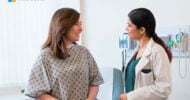
How physicians can win support for AI—and better patient care
![How primary care could transform our health system [PODCAST] welcome speech for medical students](https://kevinmd.com/wp-content/uploads/The-Podcast-by-KevinMD-WideScreen-3000-px-1-190x100.jpg)
How primary care could transform our health system [PODCAST]
![How technology can free up nurses for better care [PODCAST] welcome speech for medical students](https://kevinmd.com/wp-content/uploads/The-Podcast-by-KevinMD-WideScreen-3000-px-1-190x100.jpg)
How technology can free up nurses for better care [PODCAST]

High tech should not replace high talk and high touch in health care

How to run a successful group therapy session
Past 6 months.
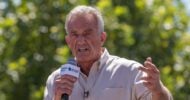
If you are pro-psychiatry, should you be anti-RFK?

Is the Goldwater Rule hindering us?

How one ER’s choice changed my son’s life forever

What the death of UnitedHealth CEO reveals about our broken health care system

How to dress like a doctor

Recent Posts
![Why failure should be part of every doctor’s story [PODCAST] welcome speech for medical students](https://kevinmd.com/wp-content/uploads/The-Podcast-by-KevinMD-WideScreen-3000-px-1-190x100.jpg)
Why failure should be part of every doctor’s story [PODCAST]

A medical malpractice lawsuit is just words: Actions speak louder than words

From burnout to breakthrough: Why treating yourself like a patient could save your medical career

Harnessing the power of AI to improve prostate cancer outcomes: A Movember mission
![How the Olympic spirit can transform diabetes care [PODCAST] welcome speech for medical students](https://kevinmd.com/wp-content/uploads/The-Podcast-by-KevinMD-WideScreen-3000-px-1-190x100.jpg)
How the Olympic spirit can transform diabetes care [PODCAST]
Subscribe to kevinmd and never miss a story.
Get free updates delivered free to your inbox.
Find jobs at Careers by KevinMD.com
Search thousands of physician, PA, NP, and CRNA jobs now.
CME Spotlights
A powerful address to graduating medical students 12 comments
Comments are moderated before they are published. Please read the comment policy .

Welcome Speech for Students
Welcome speech generator for students.
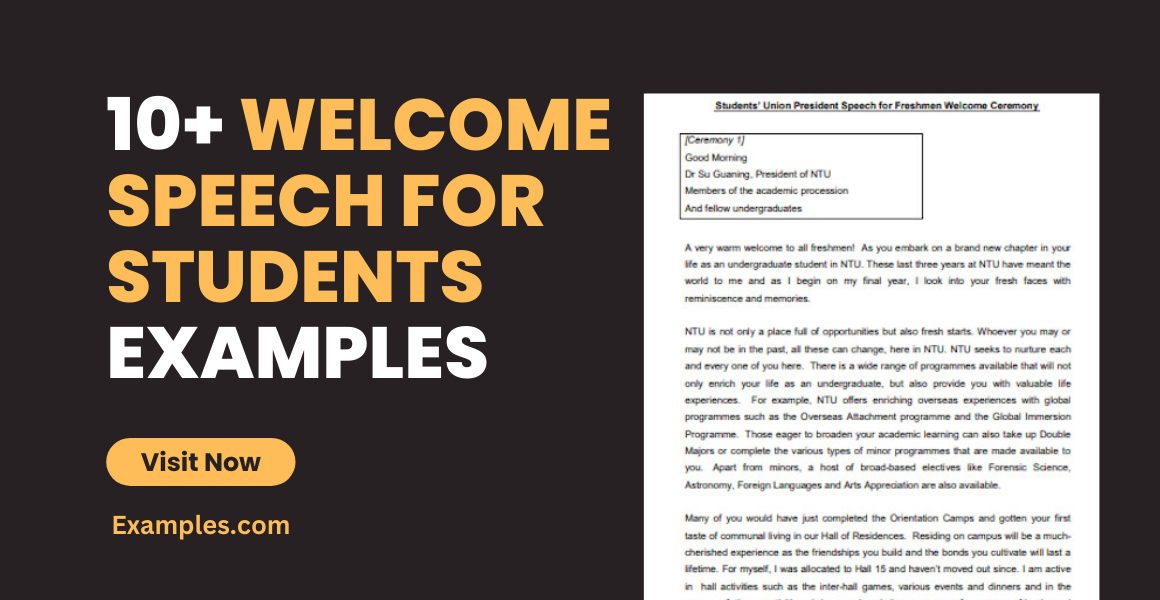
It is without any doubt making speeches can be scary. Especially when you have to be the new student in school to be told to make a speech. From a farewell speech to a welcome speech, or even an impromptu speech. This can be scary if you have no clue as to what you want to talk about or what you want to say. But hey, remember you are not alone with that. Everyone has to go through those kinds of speeches in their lives. Whether you are a professional or a student, we all go through that once or twice or many more times in our lives.
Don’t you remember when you go to a new school and this usually means new people, new faces, and new beginnings. New school usually means new people, new faces, new beginnings. Though that sounds like a sad thing to say goodbye to the old faces, there are some good things about goodbyes as well as hello’s. For graduating students, a farewell to the school they knew would seem like a sad affair but it’s looking forward to something new that makes it worthwhile.
To those students who are about to make a welcome speech or a farewell speech for the class, here are some awesome 10+ welcome speech ideas for you to check and download on. What are you waiting for? Let’s check this out.
10+ Welcome Speech for Students Examples
1. students union welcome speech.
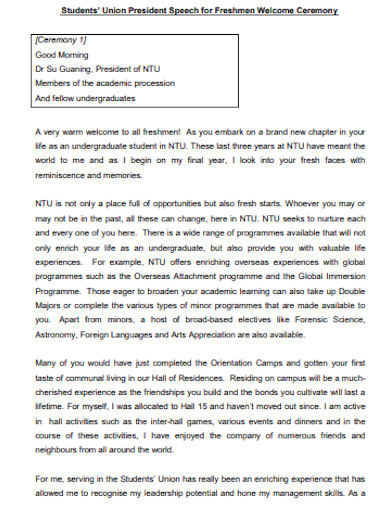
Size: 62 KB
2. Principal Welcome Speech for Students
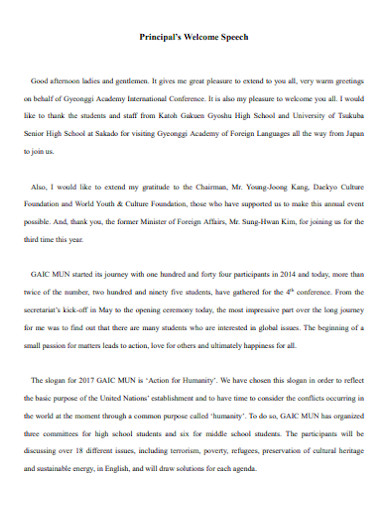
3. Annual Meeting Welcome Speech for Students
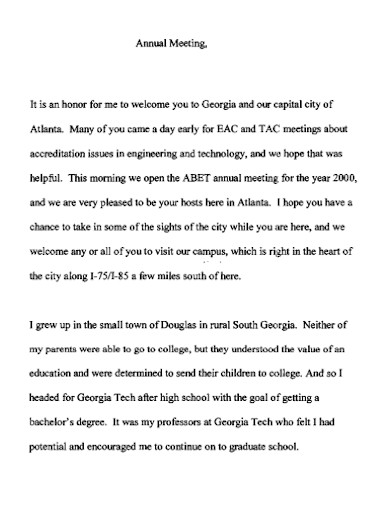
Size: 287 KB
4. Welcome Speech for Students Language
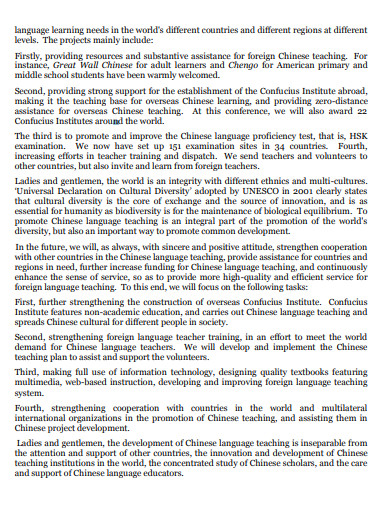
Size: 593 KB
5. Class President Welcome Speech for Students
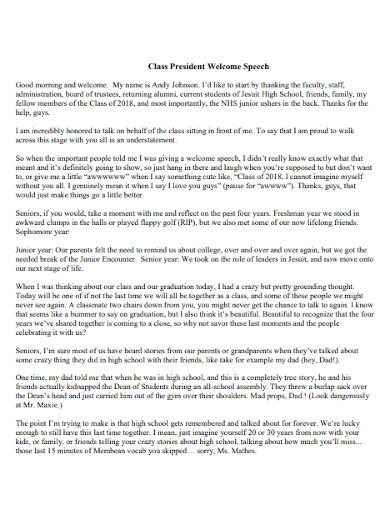
Size: 195 KB
6. Counselling Welcome Speech for Students
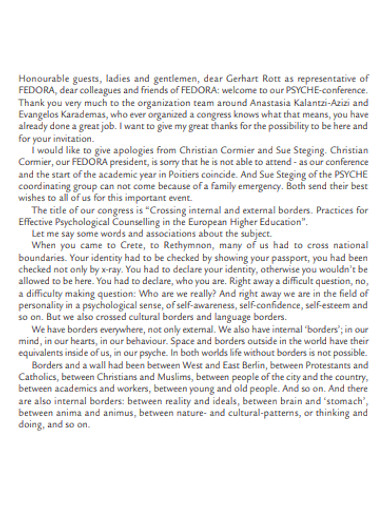
7. Reunion Welcome Speech for Students
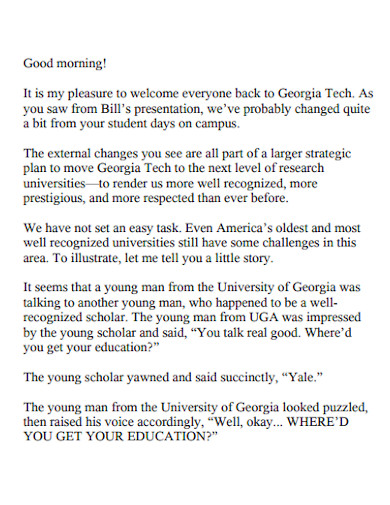
Size: 48 KB
8. Welcome Speech for Incoming Students
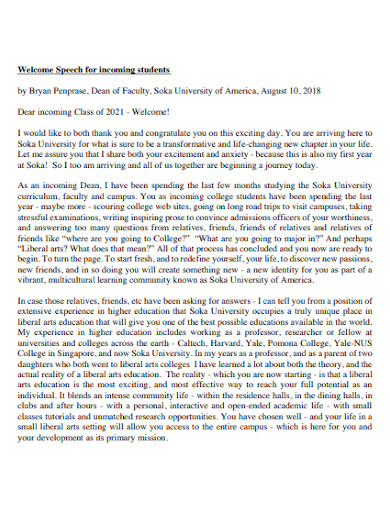
Size: 59 KB
9. Faculty Staff Welcome Speech for Students
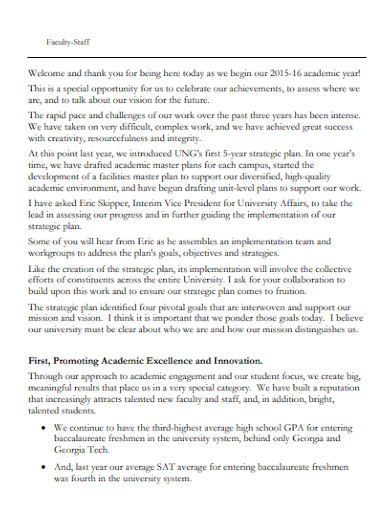
Size: 114 KB
10. Welcome Speech for First-Year Students
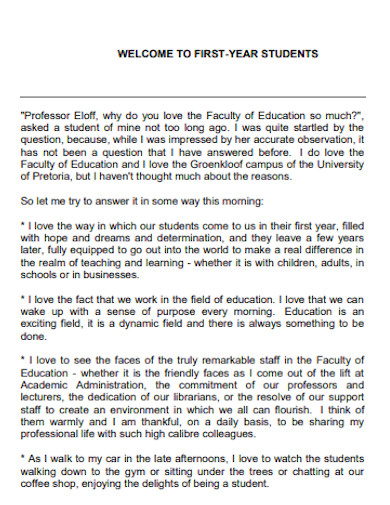
Size: 91 KB
11. Welcome Week Speech for Undergraduate Students
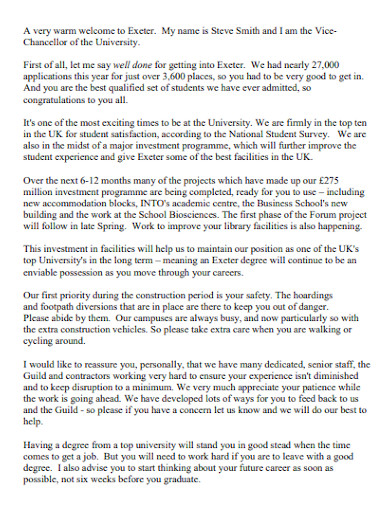
Size: 38 KB
Use Of a Welcome Speech
A welcome speech for any type of situation is often used to show hospitality to a group of people. It is also used to make people feel accepted. Welcome speeches are often used in schools for freshmen students. The people who often do these types of speeches are principals, deans or presidents in schools.
Defining the Word Speech
An important talk that is most likely an important person addressing the group. It is a formal way to deliver a message or discourse to people in the room. A talk usually given to a large group or a party for special purposes i.e. welcoming students, welcoming people, a toast to a wedding.
Tips to Write and Present a Good Welcome Speech
One thing that comes to mind when you think about a good welcome speech is how to write one and how to make it good. Okay, two things. But to write a good welcome speech, you have to consider some of these possibilities . I am not saying they would work for everyone, but I am saying is as a general point of view, they are just tips and it is clearly up to you on how to make it work. So listed below are 5 tips on how to write a good welcome speech.
- Audience : Who are your audience. Now, before you make a good welcome speech, ask yourself. Are my audiences adults, teens, children, or parents? What are they going to expect me to say? How do I deliver this speech to them?
- Topic: Choosing a topic for a welcome speech is the next thing to do. Ask yourself, who are you welcoming, and why are you writing this speech for? Who are your audiences? College students ? Employees? High School students? Children? Your topic would depend on your audience as well.
- Introduction : Your introduction does not have to be very lengthy. Your introduction should be short and to the point. You are merely telling the topic of your speech but not the speech itself. Avoid dragging the introduction and mistaking it for the body of your speech.
- Go straight to the point : Do not jump from one topic to another. Choose one topic, talk about it. Do not drag unnecessary things in your speech. This is something people should learn to avoid.
- Body Language: Watch your body language when you get up on stage to talk. Your body language says it all. Avoid staring into your speech copy. You need not memorize what you wrote, you only need to be familiar with it. Even during an impromptu speech , the best thing to remember is to be familiar with what you wrote and to remain eye contact with your audience. This is important because they need to feel and know you are addressing them.
Why is making a speech so important?
Speeches are a way for people to connect. It is a way to address things and to help people open up.
Is it normal to feel stage fright when making a speech?
Stage fright is normal when you go up to make a speech. Just breathe. You’ll be fine.
How do I memorize a speech in a day?
You do not need to memorize your speech. Rather, you should try and be familiarized with it. That way it is easier for you to remember the important key points in your speech.
How to remain eye contact when making speeches?
Glance every now and then around the people in the room. Make them feel welcome. Remember whether it is a speech made to welcome or to say your farewell, always remain eye contact. Make them feel they matter.
How to make an impromptu speech good?
Go straight to the point, do not break eye contact, be familiar with what you wish to talk about and to have fun.
Let’s face it, we all have issues way back then when making speeches. It is not something to be embarrassed about, we have all been there. The fact that making speeches is more frightening than presenting it. It is close to impossible to memorize a speech but the best thing to do is to be familiar with what you wish to talk about. Go straight to the point, don’t dawdle. Keep eye contact with your audience. Make them feel they are important, that the speech you are making or presenting is for them. As long as you follow the tips and at the same time have fun with how you present your speech, you’re good to go. Good Luck! Wow the audience.
Text prompt
- Instructive
- Professional
Create a Welcome Speech for Students returning after summer
How to draft a Welcome Speech for Students for a new academic year

IMAGES
VIDEO
COMMENTS
Dear first-year medical students, Welcome to medical school — congratulations! You have worked, sacrificed, waited for this moment for many long years, have left blood, sweat, and tears along the tracks of your life marathon. This is the first checkpoint in your journey. You've made it.
1 thought on " Words of Welcome and Advice to New Medical Students: The DeBakey Scholar Convocation Address " Jocelyn on November 4, 2014 at 4:52 am said: This speech was so touching to this aspiring doctor.
Get ready for real cases that will challenge your medical knowledge and push you to think on your feet." — END OF SPEECH — Commentary: Balances professional accomplishments with relatable student experience. Well-suited for guest lectures, student mentorship programs, or medical school events. 5. Private Practice Opening "Good evening ...
A letter to new medical students. Sue Hall, MD. Education. August 7, 2014 . 9 Shares. Share. Tweet. Share. Dear new medical student: Congratulations! You are about to embark upon an exciting, life-altering experience, one you will never forget. You are about to join an elite group of people who will now be your peers going forward.
A little while ago somebody googled my blog looking for "SPEECHES FOR NEW MEDICAL STUDENTS." (Yes, I do sometimes look at the things you type in order to find my blog. ... SPEECH #29: "WELCOME TO SECOND YEAR" SPEECH OCCASION: First day of second year SPEECH LENGTH: 10 minutes SYNOPSIS: First year was a cakewalk. This year, you have to study ...
(For the full speech, click here.) Sanford School Graduate School Orientation. Judith Kelley, Dean of Sanford School of Public Policy "Our incoming graduate students are the future of policy - and the future of our world. In this increasingly complex environment, public policy research and education is more valuable than ever before.
Dear Graduating Class of 2013, I appreciate the opportunity to address such an impressive pool of medical school attendees. From the first day of medical school when you were introduced to your cadaver, you have endured countless lectures and lab hours, physical examination and sensitivity training sessions, and ward rotations under the watchful eye of senior residents and attendings.
This month, thousands will graduate from the 170 accredited medical schools in the U.S. Many will move on to residency. But due to an unusual shortage of available slots, some hundreds of others will end up without residency in a sort of "professional no man's land." Either way, they'll all need guidance from those who've preceded them. With this in mind, we decided to take a look at some of ...
Use Of a Welcome Speech. A welcome speech for any type of situation is often used to show hospitality to a group of people. It is also used to make people feel accepted. Welcome speeches are often used in schools for freshmen students. The people who often do these types of speeches are principals, deans or presidents in schools. Defining the ...
This speech was given to the 2019 graduating class of The Frank H. Netter M.D. School of Medicine at Quinnipiac University. ... Dec 6, 2024 Link to To the Medical Student Who Held My Hand. Op-Med provides clinician authors like you a place to share thoughts, opinions, and knowledge with the largest medical community in the United States. ...